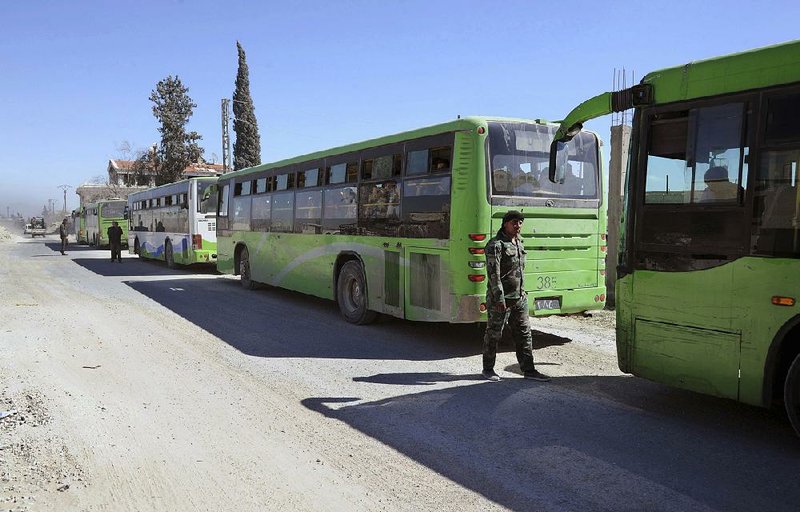BEIRUT -- Airstrikes in Syria killed more than 100 people Friday as civilians fled besieged areas for the second straight day and as Syrian government forces stepped up their offensive in the rebel-held eastern suburbs of the capital, Damascus.
Under the cover of Russia's air power, President Bashar Assad's forces captured a key town and closed in on another.
Most of the deaths Friday occurred in eastern suburbs of Damascus, known as eastern Ghouta, where government forces have been on a crushing offensive for three weeks -- capturing 70 percent of the once-besieged rebel-held area. The weekslong violence left more than 1,300 civilians dead and 5,000 wounded and forced thousands of people to flee to government-controlled areas.
Friday's death toll came a day after Syria passed the seven-year mark in its civil war that has killed about 450,000 people and displaced half the country's population.
The Britain-based Syrian Observatory for Human Rights said government and Russian forces had been bombing rebel-held areas outside Damascus throughout Friday, killing 64 people in Kafr Batna and another 12 in Saqba. The Syrian Civil Defense search-and-rescue group reported 61 fatalities in Kafr Batna.
Later Friday, government forces captured the town of Jisreen, closing in on Saqba from the east, north and south and forcing opposition fighters to retreat west. The Syrian government is determined to seize Kafr Batna, Saqba and the rest of the besieged eastern Ghouta region from rebels.
Meanwhile, the Observatory said Turkish shelling and airstrikes have killed another 36 people in the Kurdish-held town of Afrin in northern Syria, where Turkish troops and Turkey-backed Syrian opposition fighters have been on the offensive since Jan. 20. Turkey is getting closer to capturing the main town in the region, also called Afrin.
The attack on Kafr Batna was with cluster bombs, napalmlike incendiary weapons, and conventional explosives, the Observatory said.
The attack was part of an indiscriminate campaign by Assad's forces to retake the town and the rest of the enclave from the rebels.
"If the world does not move, Ghouta will be exterminated," said Siraj Mahmoud, a Civil Defense member in eastern Ghouta.
A medical charity supporting hospitals in the Ghouta region, the Syrian American Medical Society, said doctors in Kafr Batna were treating patients for severe burn wounds.
Oways al-Shami, a spokesman for Syrian Civil Defense, said the airstrikes targeted a market and a nearby residential area where scores of people had gathered to buy bread and vegetables during a daily truce called by Russia.
Exhausted and shell-shocked civilians streamed out of the rebel enclave Friday, a day after tens of thousands evacuated the area in the biggest single-day exodus of the war.
Syria's U.N. Ambassador Bashar Ja'afari told the U.N. Security Council that more than 40,000 civilians left eastern Ghouta on Thursday through a new security corridor opened by the government in the recently retaken town of Hamouria. An additional 30,000 people fled the Turkish military offensive on Afrin, according to the Syrian Observatory for Human Rights.
A man interviewed Friday on state-affiliated al-Ikhbariya TV said he had gone two days without food. Others said rebels hoarded food and humiliated civilians, even shooting people trying to leave.
The U.N. has warned of a malnutrition crisis in eastern Ghouta, which human-rights groups have blamed on the government's strangling blockade.
Staffan de Mistura, the U.N. envoy for Syria, told the Security Council that although a six-day cease-fire was largely holding in Douma, the largest city in eastern Ghouta, fighting has escalated elsewhere in the rebel-held region where 400,000 people are estimated to be holed up.
In Afrin, the Turkish military urged civilians to leave and Syrian Kurdish militiamen to surrender to the besieging Turkish forces.
The media office for the Syrian Democratic Forces, a Kurdish-led and U.S.-backed force that operates in the Kurdish autonomous region, said at least 30 people were wounded in Friday's attacks.
Since their January offensive began, Turkish forces have nearly encircled Afrin as they press their campaign to drive the Syrian Kurdish fighters from the town and surrounding region, where tens of thousands of civilians are still believed trapped.
On Friday, Turkish aircraft dropped flyers in Arabic and Kurdish on Afrin, asking residents to stay away from "terrorist positions" -- referring to the Syrian Kurdish fighters -- and to not let themselves be used as "human shields."
Meanwhile, the U.N. Security Council again demanded a cease-fire throughout Syria and backed a U.N.-endorsed roadmap for a peaceful transition and elections. Members reaffirmed that U.N.-led talks in Geneva "remain the central process to find a political solution."
Information for this article was contributed by Suzan Fraser and Nataliya Vasilyeva of The Associated Press.
A Section on 03/17/2018
